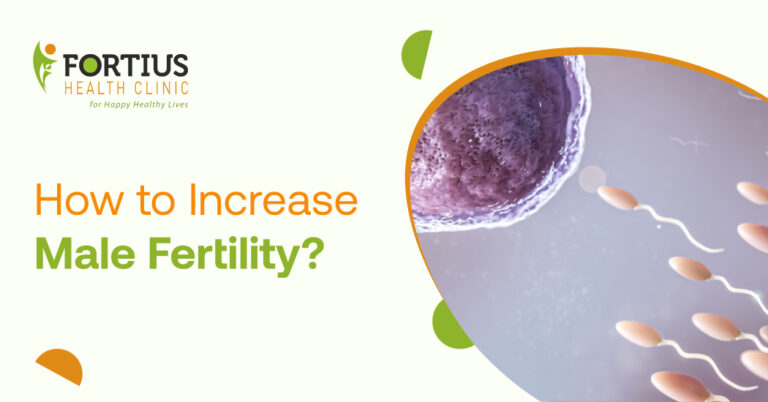
How to increase male fertility
Even if it makes logical, you might be surprised to learn that men are partially or completely to blame for 50% of all cases of infertility (also known as male factor infertility). The good news is that most men regularly produce fresh sperm. A guy can also considerably enhance his sperm count and motility, improve their morphology, and raise his overall male fertility by making the correct lifestyle adjustments.
Pro tip: Since sperm take about 40–80 days to fully mature, it is best to make modifications at least 40–90 days before semen (re)assessment, trying to conceive, or undergoing fertility treatments like IUI or IVF.
Assessing Male Fertility
Let’s quickly review sperm analysis and how to determine if you need to enhance sperm motility, count, or other factors before we go into how to increase male fertility. The analysis of the semen is the first step (actually, maybe the first is understanding you’re having problems getting pregnant). The most common and reliable method for determining sperm count, motility, and fertility is semen analysis. A doctor can assess a man’s sperm viability with the aid of a semen analysis. It will also determine whether infertility is being caused by sperm malfunction or low sperm count. A semen analysis is a relatively basic test for male fertility that gathers several important data points, with three primary characteristics of sperm being the focus.
- Sperm Count – the concentration of sperm per mL of semen
- Sperm Motility – the degree to which sperm migrate ahead in time
- Sperm Morphology – the sperm’s form and appearance
Your fertility doctor can suggest further male fertility testing if a semen test yields abnormal results. It’s critical to keep in mind that the outcomes of a semen study represent only your sperm parameters at that particular moment. The remainder of this post will focus on the various strategies you can use to boost your sperm count and enhance your overall fertility.
How to Increase Seamen Count, Motility, and Overall Male Fertility Naturally
Although you may have come to this page in search of foods, supplements, or other lifestyle changes to boost your motility and sperm count, the truth is that cutting out certain foods can boost male fertility just as much as include a few unique ones. In order to boost your sperm count, motility, and other factors, we’ll go over what you should add to your life as well as what you should avoid doing.
Quit Smoking
The census has been completed. For almost all metrics related to male fertility, smoking is clearly detrimental. In comparison to nonsmokers, heavy smokers had 19% less sperm in one study including over 2,000 men.
Another large study of over 1,700 men found that again, male fertility suffers from smoking.
| Sperm Density | Sperm Count | Sperm Motility |
| -15.3% | -17.5% | -16.6% |
Numerous more research have also demonstrated the detrimental effects of smoking on male fertility, adding to the body of data.
Another study concentrated especially on men who had already experienced long-term alcohol intoxication. The results of the study showed that within three months of alcohol cessation, semen qualities significantly improved. The morphology and volume of sperm were consistently negatively impacted by daily alcohol consumption, according to a study of 15 studies on the topic of alcohol and male fertility. Combining alcohol and tobacco use has also been linked to sperm DNA damage and deteriorating semen quality.
All of this points to the very clear conclusion that quitting smoking can improve male reproductive markers including motility and sperm count.
Conclusion: Stop smoking to increase sperm count and motility.
Limit Alcohol
Pregnant women have traditionally been the focus of most studies on alcohol and fertility because we are so aware of the risks associated with drinking. But things are shifting with the times. According to recent research on men, alcohol consumption may have an effect on general sexual health and male fertility. One particular study looked at how guys who drink alcohol and those who don’t differ in terms of sperm quality. The results showed a relationship between increasing alcohol use and a consistent deterioration in semen quality. The volume, vitality, and survival rate of sperm decrease with increasing alcohol consumption. Just 12 percent of the drinkers under investigation had normal semen levels.
Another study focused particularly on men with a history of chronic alcohol intoxication. The study displayed a drastic improvement of semen characteristics within three months of alcohol withdrawal. A review of 15 studies on alcohol and its effects on male fertility found that daily alcohol consumption had a consistently negative impact on sperm morphology and volume. Using alcohol and tobacco together has also been tied to declining semen quality and sperm DNA damage.
Conclusion: Limit alcohol consumption to increase male fertility and reduce DNA damage of sperm.
Drinking too much can harm sperm. Drinking alcohol can reduce testosterone levels, decrease the testes, and alter the size, shape, and motility of sperm. The good news is that it seems that alcohol has reversible effects on the health of sperm. Because it takes sperm up to eighty days to grow, if you believe you want a child, you might want to consider reducing your alcohol intake three months before attempting to conceive.
Get Tested for STIs and STDs
The male reproductive system is known to be impacted by sexually transmitted infections (STDs). Research has demonstrated that testicular inflammation can be brought on by chlamydia [19]. Epididymal blockage may result from this inflammation. The testicle and the male reproductive system are connected via the epididymis. Chlamydia is known to have a detrimental effect on female fertility in addition to male fertility problems. Pelvic inflammatory disease (PID) can result from chlamydia if treatment is not received.
Sexually transmitted diseases (STDs) are linked to infectious semen and raise the risk of HIV transmission. HIV results in immunodeficiency and degradation of the semen in men. HIV can lower the likelihood of getting pregnant and increase the risk of miscarriage if it is transferred to the female partner.
It is crucial to be tested if you think you or your spouse could have a STI or STD. According to an analysis of World Health Organization studies, there were over 273 million cases of treatable sexually transmitted infections (STIs) among individuals in the 15–49 age range in 2012 alone. There were 128 million chlamydia infections, 27 million gonorrhea cases, 101 million trichomoniasis cases, and 18 million syphilis cases. For both men and women diagnosed with STIs and STDs, there are fertility treatments available.






